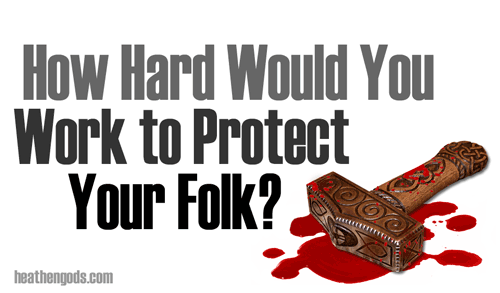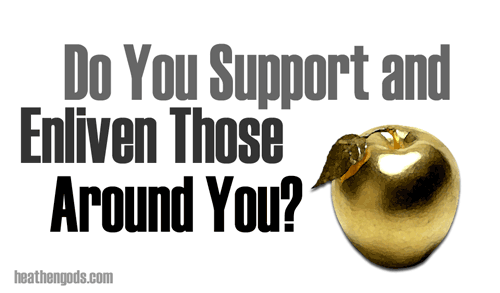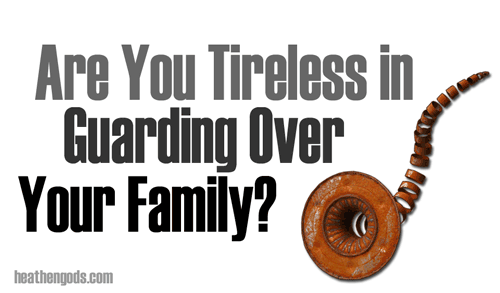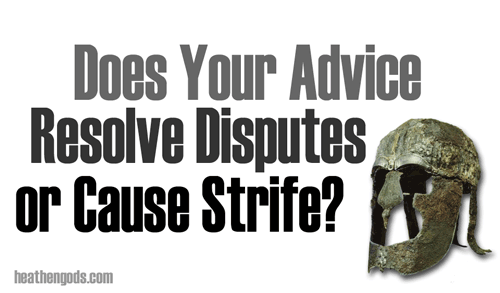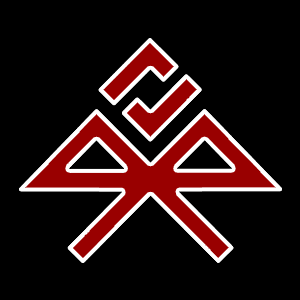|
The following questions and graphic designs were designed for social networking. The purpose was to create eye-catching and thought-provoking images that could be posted and shared on Facebook or Google+, with a goal of educating people about Asatru/Heathenry. Explanations were posted with each image, and those explanations are included below. The questions presented are well worth considering, and we have plans to create additional images over time. You can click on each image below to access a larger version of the image. We grant blanket permission for anyone to share these images on-line. Under the root (of Yggdrasil) that turns in the
direction of the frost giants lies the spring of Mímir, in
which is
------------ It is said that Odin's eye rests in the well of Mimir...and that Odin traded his eye for just one drink from the wisdom-rich waters of that well. What work will you do for wisdom? How hard will you work and what will you sacrifice of yourself to attain it? The beginning of this story is that Baldr the Good had some terrible dreams that threatened his life. When he told the Æsir these dreams, they took counsel together and it was decided to seek protection for Baldr from every kind of peril. Frigg exacted an oath from fire and water, iron and all kinds of metals, stones, earth, trees, ailments, beasts, birds, poison and serpents, that they would not harm Baldr. And when this had been done and put to the test, Baldr and the Æsir used to amuse themselves by making him stand up at their assemblies for some of them to throw darts at, others to strike and the rest to throw stones at. No matter what was done he was never hurt, and everyone thought that a fine thing. When Loki, Laufey's son, saw that, however, he was annoyed that Baldr was not hurt and he went disguised as a woman to Fensalir to visit Frigg. Frigg asked this woman if she knew what the Æsir were doing at the assembly. She answered that they were all throwing things at Baldr, moreover that he was not being hurt. Frigg remarked: "Neither weapons nor trees will injure Baldr; I have taken an oath from them all." The woman asked: "Has everything sworn you an oath to spare Baldr?" Frigg replied: "West of Valhalla grows a little bush called mistletoe, I did not exact an oath from it; I thought it too young." Thereupon the woman disappeared. Loki took hold of the mistletoe, pulled it up and went to the assembly. Now Höð was standing on the outer edge of the circle of men because he was blind. Loki asked him: "Why aren't you throwing darts at Baldr?" He replied: "Because I can't see where Baldr is, and, another thing, I have no weapon." Then Loki said: "You go and do as the others are doing and show Baldr honour like other men. I will show you where he is standing: throw this twig at him." Höð took the mistletoe and aimed at Baldr as directed by Loki. The dart went right through him and he fell dead to the ground. This was the greatest misfortune ever to befall gods and men. ------------ So worried was Frigg for her son's life, that she elicited oaths from everything not to harm her son, but tragically underestimated Mistletoe. This story underlines the lengths to which parents will go to safeguard their children, and the lengths to which we all go to safeguard our loved ones (among other lessons). Thór has two goats known as Tooth-gnasher and Gap-tooth, and the chariot he drives in. The goats pull the chariot, and for this reason he is called Oku-Thór (Driver-Thór). He also owns three precious things. One is the hammer Mjöllnir (Crusher), which the frost ogres and cliff giants know when it is raised aloft, and that is not surprising since he has cracked the skulls of many of their kith and kin. His second great treasure is a belt of strength, and when he buckles that on his divine might is doubled. And he owns a third thing of great value in his iron gauntlets; he cannot do without these when he grips the handle of the hammer. But no one is well-informed enough to be able to recount all his mighty deeds. I can, however, tell you so many things about him that it would take a long time before all I knew had been related.' ------------ In our Lore, Thor is a tireless defender against the chaos and harm that destructive Jotuns threaten to bring about. Just how hard are you willing to work in defense of our Folkway and our way of life? Does your family, your kindred, and your friends count on you for their protection, and do they see you as a stalwart defender? Just something to consider now and again. The hammer pictured in the graphic image was made by Jan Fibiger, and is used here with his permission. He is an amazing artist. His Deviant Art page is here: http://fibacz.deviantart.com/
According to the Lore, the gods decided to shackle the Fenrir the wolf because he threatened to eat all the worlds. The beast broke every chain they put upon him. Eventually the Gods had the dwarves make them a magical ribbon called Gleipnir. It appeared to be only a silken ribbon but was made of six wondrous ingredients: the sound of a cat's footfall, the beard of a woman, the roots of a mountain, bear's sinews, fish's breath and bird's spittle. Fenrir sensed the gods' deceit and refused to be bound with it unless one of them put his hand in the wolf's mouth. Tyr, known for his great wisdom and courage, agreed, and the other gods bound the wolf. After Fenrir had been bound by the gods, he struggled to try to break the rope. When the gods saw that Fenrir was bound they all rejoiced, except Tyr, who had his right hand bitten off by the wolf. Fenrir will remain bound until the day of Ragnarök. As a result of this deed, Tyr is called the "Leavings of the Wolf"; which is to be understood as a poetic kenning for glory. It begs the question as to how brave are you on behalf of your Folkway. Do you live openly as a heathen? What are you willing to risk in order to safeguard your family, your kindred, and your close friends? Do you stand up for yourself and your Folk against all threats, including those that would harm emotionally, mentally, physically, and spiritually? 'Bragi's wife is Iðun. (One-who-renews) She keeps in her box the apples the gods have to eat, when they grow old, to become young again, and so it will continue up to Ragnarök (the twilight of the gods).' Then Gangleri
said: The following story tells of what goes wrong when Iðun was stolen away by the giants, with Loki's help of course. At the time agreed on, Loki enticed Iðun out from Asgarð into a wood, telling her that he had found some apples she would prize greatly and asking her to bring her own with her for comparison. Then the giant Thjazi came there in the form of an eagle, and seizing Iðun flew away with her to his house in Thrymheim. The Æsir, however, were much dismayed at Iðun's disappearance, and they soon grew old and greyhaired. They held an assembly and asked one another when Iðun had last been heard of, and realized that the last time she had been seen she was going out of Asgarð with Loki. Then Loki was captured and brought to the assembly and threatened with death or torture. He grew so frightened that he said he would go after Iðun into Giantland, if Freyja would lend him her falcon coat. When he got the falcon coat, he flew north to Giantland. Loki arrived at the giant Thjazi's on a day when he had gone out rowing on the sea and Iðun was at home alone. Loki changed her into the form of a nut, and holding her in his claws flew off at top speed. When Thjazi came home, however, and saw that Iðun was missing, he assumed the shape of an eagle and flew afier Loki, with a tremendous rush of air in his wake. The Æsir, seeing the falcon flying with the nut and the eagle in pursuit, went out under the walls of Asgarð carrying bundles of plane shavings. When the falcon reached the stronghold, he dropped plumb down at the fortress wall and then the Æsir set fire to the plane shavings. The eagle, however, was unable to check his course when he lost the falcon and his feathers caught fire and then he did stop. The Æsir were hard by then and they killed the giant Thjazi inside the gates, and that slaying is very famous. ------------ Idun's apples lend the Gods and Goddesses their strength, their youth, and their vitality. Without Idun and her apples, they grow old and greyhaired. Does your presence among your family and kindred support and enliven those around you? When they grow tired, do you encourage them and lend a hand? When they become frustrated, do you work at their side and help them through their challenges? When your energy wanes in your own efforts, do you allow your family and kindred to support and enliven you? Frey is an exceedingly famous god; he decides when the sun shall shine or the rain come down, and along with that the fruitfulness of the earth, and he is good to invoke for peace and plenty. He also brings about the prosperity of men. ------------- 'There was a man called Gymir whose wife Aurboða was of the family of cliff giants. Their daughter is Gerð, who is an exceedingly beautiful woman. One day when Frey had gone to Hliðskjálf and was looking out over the whole world, he looked towards the north and saw in one place a large and beautiful dwelling. To this house went a woman; and, when she raised her arms to open the door, they illuminated the sky and sea, and the whole world grew bright from her. So, for the presumption he had shown in seating himself on that holy seat, he paid by going away full of sorrow. When he came home, he neither spoke nor slept, nor did he drink anything, and no one dared to address him. Njörð summoned Frey's chamberlain, Skirnir, and bade him go to Frey and ask him on whose account he was so angry that he would speak to no one. Skirnir said that he would go, but he was not eager and he said he expected an unpleasant answer from him. When he came to Frey, he asked him why he was so downcast that he would not speak with anyone. Then Frey replied, saying that he had seen a beautiful woman and on her account was so distressed that he would not live long if he could not obtain her. "And now you are to go" (he said), "and woo her for me and bring her here whether her father wishes it or not. I will reward you well for it." Skírnir answered saying that he would go on that errand but Frey was to lend him his sword, which was such a good one that it fought by itself Frey agreed to that and gave him the sword. Then Skírnir went and wooed the woman for him and obtained her promise that, nine nights later, she would come to a place called Barrey and there marry Frey. When, however, Skírnir told Frey the result of his mission, Frey said: "One night is long, long is a second, how shall I three endure? shorter to me has a month often seemed than this half bridal-eve." This was the reason why Frey had no weapon when he fought with Beli but killed him with a hart's horn.' Then Gangleri
said: Then High One
answered: 'One is called Heimdall. He is called the white god, and he is great and holy. Nine maidens gave birth to him, and all of them sisters. He is also known as Hallínskíði and Goldtooth, he had teeth of gold. His horse is called Goldtuft. He lives in a place called Himinbjörg (Cliffs-of-heaven) by Bifröst. He is the warder of the gods, and sits there at the end of heaven to guard the bridge from the cliff giants. He needs less sleep than a bird, and can see a hundred leagues in front of him as well by night as by day. He can hear the grass growing on the earth and the wool on sheep, and every-thing that makes more noise. He has the trumpet known as the horn Gjöll, and its blast can be heard over all the worlds. A name for the head is Heimdall's sword. So it is said:
------------- Heimdall guards his people with tireless and unwavering attention to his duty. May we all put such unrelenting effort into the task of safeguarding our families, our kindreds, our loved ones, and our Folk... 'Forseti is the son of Baldr and Nanna, Nep's daughter. He owns the hall in heaven known as Glitnir (Glittering). Without exception all who come to him with legal disputes go away reconciled; that is the best court known to gods and men. As it says here:
------------- Do you give wise advice? Are you someone that others would turn to for assistance in resolving a dispute, and if you are...does your advice allow all parties to walk away reconciled? Or does your advice cause division and strife within your local community, and the heathen community at large? Strife is sometimes necessary. But, look at the information about Forseti. "Without exception all who come to (Forseti) with legal disputes go away reconciled." I firmly believe we have too much strife within our local kindreds, within our regions, and within and between the national organizations. So, the question stands: Does your advice - your rede - resolve disputes or cause strife. When two good heathens come to you for mediation or advice, do you help them solve the problem...or encourage strife? Do you work to solve problems to everyone benefit, or do you see every issue...every matter...every situation as a fight to be had, and a battle to be won? Do you look to commonalities between yourself and other heathens, or always strive to find every little difference so you can debate, argue, and tear other people down needlessly? We would all benefit from asking ourselves these questions...
Over time, we will add more images to this collection. As stated before, we grant blanket permission for anyone to share these images on-line.
|



